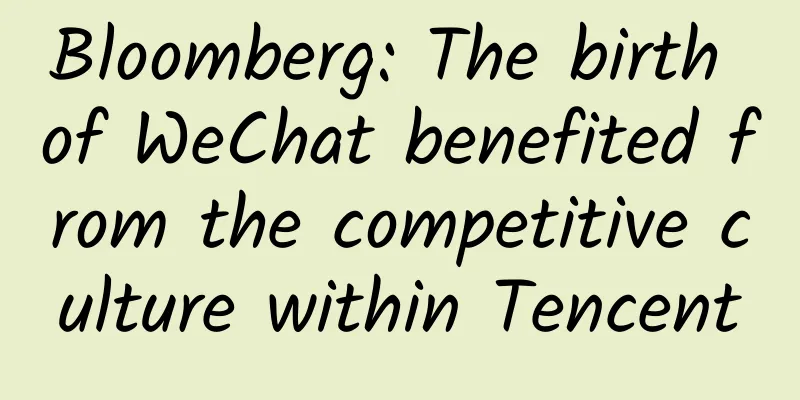Bloomberg: The birth of WeChat benefited from the competitive culture within Tencent

|
Tencent's new headquarters building in Shenzhen Tencent is currently China's most valuable listed company, and the success stories emerging within it sometimes require the stimulation of competition. Tencent's popular WeChat service is a product of this stimulation. Before WeChat was launched, Tencent founder Ma Huateng encouraged employees to compete with each other to create a mobile communication service. WeChat now has more than 805 million users, who use it not only for communication but also for games, payments and fund purchases. This blockbuster product has helped Tencent grow into China's largest listed company, with a current market value of HK$1.97 trillion (about US$257 billion). As Tencent enters the field of live video, Ma Huateng hopes to copy the successful experience of WeChat and let at least six subsidiaries compete in this industry. Some institutions predict that the market size of live video in China will be nine times the current size by the end of 2020, reaching about US$13 billion. Andy Mok, founder and CEO of recruitment company Red Pagoda Resources, said: "Tencent's culture is like the womb of a shark. Although this competitive culture is not fatal, it makes each member adjust faster and more competitive." Studies have found that shark embryos will devour their brothers and sisters to ensure their own survival. This culture of competition among colleagues has been touted by companies such as Goldman Sachs Group and General Electric. Ma Huateng, China's third-richest man, said in December that internal competition is a necessary driving force for innovation. In addition to the live video service, Tencent currently operates at least four music apps, three companies developing virtual reality technology and two film companies. “We have the spirit of a startup,” said Ross Liang of Tencent’s social networking group. “At Tencent, there are no clear rules about what you can’t do.” Live Video Tencent, which is listed in Hong Kong, has seen its share price rise 36% this year, while the Hang Seng Index has only risen 5.9%. Among Tencent's newer ventures, live video streaming has the most commercial potential. These services allow users to broadcast themselves in real time while eating, driving or putting on makeup. A report released by HSBC in July pointed out that the scale of the live video market in China was about 9 billion yuan last year and will grow to 85 billion yuan by 2020. During the same period, the number of active users is expected to more than triple to 491 million. Due to the lack of external competitors, live video streaming will be fertile ground for domestic Chinese companies. According to market research firm iiMedia, there are currently about 200 domestic live streaming services, and Alibaba and Baidu are also involved. Currently, the largest live video services in China are Momo, Me under Huya, and Inke. Tencent's stock price has been soaring since the launch of WeChat Virtual Bonfire In China, both celebrities and internet celebrities can interact with fans through live broadcasts and exchange virtual gifts from fans for cash. At the same time, they can also sell their own products through live broadcasts. According to a report released by Credit Suisse in July, live broadcasters can usually keep 30% of the income after the virtual items are cashed out, and the rest belongs to the platform. “Live video is a virtual campfire,” said Nir Eyal, author of “Hooked: How to Build Habit-Forming Products.” “The faster the livestreamer gets feedback, the easier it is for the technology to become a habit, become stickier, and increase user engagement.” Market research firm Zero2IPO said that the total capital raised by startups in the video live streaming field is about US$750 million. Tencent is making a push into live video streaming, with products including QQ Live, Huayang, NOW Live, eGame, WeSing and Penguin Live. The number of people in China who are connected to the Internet via smartphones has grown to about 656 million, according to Chinese government data. Separate development Tencent is also trying to keep up with a structural shift in China's advertising market, with advertisers' spending on mobile ads set to triple to around 497 billion yuan over the next four years. Each of Tencent's live video teams has a different focus area, ranging from sports to karaoke and games. Ross Liang, who is in charge of QQ Space live broadcast products, said they needed to start their own business before Tencent promised to invest more money and help promote it. In a charity fundraising live broadcast event, the star's performance attracted more than 17 million viewers. The culture of competition has permeated Tencent employees, who are often told to look for new products emerging in the industry. Alex Bai, a former product director at Tencent who now works for Baidu, said that if you fail to detect these new trends, you will be surpassed by other employees, which is considered a shame. Fresh ideas usually come from grassroots employees, and employees who come up with good ideas can get cash rewards, ranging from 500 yuan for redesigning the interactive interface to 1 million yuan for major innovations. Alex Bai once received a 300,000 yuan reward for improving the company's advertising business. WeChat communication “It’s always a very cool thing when you win something, no matter how small it is,” Bai said. “It has become a deeply ingrained part of Tencent’s culture.” At Tencent's monthly meetings, everyone from vice presidents to new employees discuss their latest products. Tencent's No. 2 executive, Martin Lau, attends meetings that can last three hours, and sometimes even Ma Huateng shows up. The decision-making process is also less formal, Mr. Liang said. Business units communicate via WeChat, sometimes with requests from Mr. Ma or Mr. Liu to join the discussion, and then executives start asking questions. Alex Bai said: "Some things are encouraged by the big bosses. They hope that each group has a certain amount of freedom because they don't know which group will come up with a better product." As a winner of Toutiao's Qingyun Plan and Baijiahao's Bai+ Plan, the 2019 Baidu Digital Author of the Year, the Baijiahao's Most Popular Author in the Technology Field, the 2019 Sogou Technology and Culture Author, and the 2021 Baijiahao Quarterly Influential Creator, he has won many awards, including the 2013 Sohu Best Industry Media Person, the 2015 China New Media Entrepreneurship Competition Beijing Third Place, the 2015 Guangmang Experience Award, the 2015 China New Media Entrepreneurship Competition Finals Third Place, and the 2018 Baidu Dynamic Annual Powerful Celebrity. |
<<: Can OLED TVs "replace" traditional LCD TVs?
Recommend
Electric Technology Car News: Although it is a low-end model, it is popular. Can the low-key BMW 528Li increase sales?
The character who plays a lot of roles in the fir...
Review of mainstream active safety technologies for driverless cars
At present, the most popular topics in the automo...
What is crawl frequency? Under what circumstances can the crawl frequency cap be adjusted?
Crawl frequency refers to the total number of tim...
"Commercial Office∞|Haozu Xiaolou Product Upgrade Conference" was successfully held in Beijing
On November 18, Haozuo, a full value chain commer...
What happened with the Netherlands destroying millions of flowers? What is the reason?
It is currently the tulip blooming season. Accord...
Car Home Page Performance Monitoring Construction Practice
1. Introduction Paying attention to user experien...
Don’t know how to write a Mother’s Day copy? Share 9 classic cases of brands leveraging momentum!
Mother's Day is a holiday to thank mothers. N...
Apple tax suffered a heavy blow! The court ruled that the App Store must open third-party payment within 90 days
This article is reprinted with permission from AI...
How to run a successful social media marketing campaign?
Product sales are not increasing? Sale! User purc...
Why is it that the more you love, the easier it is to quarrel?
Planning and production Source: CCTV.com Reviewer...
How much does it cost to develop Alibaba’s health products mini program? What is the quote for developing Alibaba’s health care product mini program?
Ali health care products applet development price...
Complete operation and promotion plan steps!
Operations are basically a process of constantly ...
What can you calculate by observing the stars at night and counting with your fingers?
Author: Chen En (Purple Mountain Observatory, Chi...
Five major subjects that a novice operator must go through!
A fresh graduate asked me: Han Li, I want to ente...
How does bidding reduce costs? How to reduce costs with Baidu bidding?
Bidding itself is a place to spend money. If the ...








![[Smart Agriculture Illustrated] Have you ever eaten turbot? A picture to understand the breeding story of "Duobao No. 2"](/upload/images/67f228b8891ca.webp)
